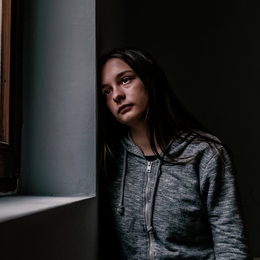
OK to Not Be OK
To help young people who struggle with mounting stressors, begin by normalizing care for mental health.
Despite the ubiquity of technology and other quality-of-life advances, Carol Murray* is glad she is not coming of age in the 2020s. She sometimes feels like she is, however, because of her youngest daughter, Lindsey*.
“She’s 14 now, and she’s been having a tough time,” Murray says. “She doesn’t come out and say that outright, but you can tell. The things she talks about from what she’s seen in school, what she sees on the internet, the things [her classmates] have texted to her … it’s sort of shocking.”
Murray’s two older kids—both in their early 20s at this point—enjoyed a “relatively normal” childhood, as she describes it, but “the world has gone crazy in the years since they grew up.” The pandemic thrust her youngest into a bubble of self-isolation, and the constant communication with friends via smartphone was an inelegant replacement for in-person contact. Murray has since seen symptoms of anxiety flower in her daughter.
Murray and her husband prohibit Lindsey from access to her smartphone between 9 p.m. and 8 a.m., which has caused another issue: FOMO, or fear of missing out. She is, however, thankful that the school year has come to an end; the recent tragedy in Uvalde, Texas, had her counting the days until the last day of school.
“Selfishly, I’m so glad I’m not growing up at this moment in time,” Murray says. “Sometimes I think I’m more fearful than [Lindsey] is—fearful for her—because she has grown up in this backwards environment; to her it’s almost normal.”
A lot of people are struggling now, according to Chris Pagnani, M.D., the founder and medical director of Rittenhouse Psychiatric Associates. Over the last two years, Dr. Pagnani says his Philadelphia-based practice has seen “about a doubling of volume regarding calls for new patient visits.” Likewise, existing patients have requested visits more frequently for difficulties such as anxiety and depression.
“We’ve also seen an increase in patients calling for psychotherapy, wanting to learn coping skills or ways to manage stressors,” Dr. Pagnani says. “Many of these individuals do not have a specific diagnosis, but nonetheless can benefit from cognitive behavioral, supportive, or mindfulness-based therapy and coping skills.
“Unfortunately, we’ve also seen an increase in substance use disorders and individuals seeking treatment for that as well,” he continues. “Our practice has actually doubled in size over the last two years. And we now have over 20 psychiatrists, psychiatric nurse practitioners, and psychotherapists who can see patients in office or with virtual visits.”
On a positive note, virtual visits have made it easier for patients to receive the care they need. He has also been heartened by what he calls “the normalization of mental health and treatment.”
Dr. Pagnani acknowledges that coming of age has always presented its share of challenges; by definition, it’s a time of transition. Still, he says his practice has fielded more calls for child and adolescent appointments of late, which he attributes in part to an increase in life’s stressors. For example, a culture of constant communication and “the ability to be plugged in 24-7” has resulted in “mental health consequences” for children and young adults.
To overcome such influences, young people need to learn to manage their emotions, and be present with their thoughts and actions. Doing so may help them to tolerate stress more effectively and prevent emotional vulnerabilities.
“When most of us were children, if we had a difficult day at school or were teased by peers, when we left school we could—at least to some extent—leave that difficult day behind us, focusing on time with our neighborhood friends and families at home,” he adds. “Unfortunately, nowadays children and teens can continue to be teased or even bullied virtually, around the clock. Everyone needs a break from life’s stressors, especially our children.”
Dr. Pagnani’s recommendation to parents and family members: Be supportive of those who are struggling and continue to normalize care for mental health; also, remind those who are struggling that anxiety, depression, and other mental health issues are very treatable.
“Parents should check in regularly with their children,” he adds. “Ask them how their day was, ask them how they’re feeling, ask them about their friends, and let them know that if they are having difficulty, there are people they can talk to. … If your child has difficulty breathing, they’d see a pediatrician or pulmonologist. If they have difficulty with their feelings, they should talk to their pediatrician, a psychiatrist, or child therapist about it.”
As for Carol Murray, she and her husband continue to offer support to Lindsey, their youngest daughter. It would nice if “the temperature comes down,” as she puts it, so her daughter and other young people have fewer stressors to deal with in the near future.
“The only thing I ever really wanted was to have all my kids have the same kind of upbringing I did,” she says. “Right now, we’re batting two out of three. … My [youngest] daughter should have the chance to be a kid without all these other things getting in the way.”
* Names changed to protect privacy.
Published (and copyrighted) in Suburban Life magazine, June 2022.


